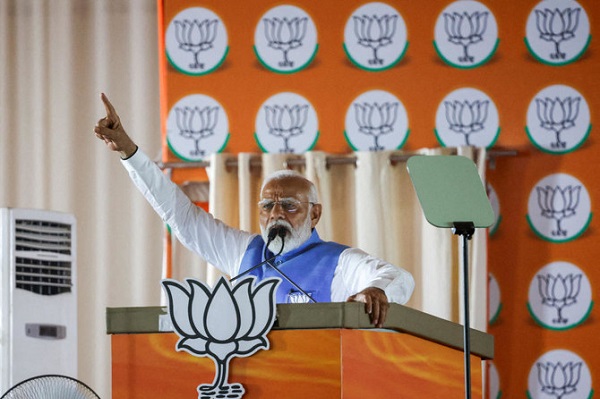KARACHI: Pakistan Stock Exchange above the 98,000 mark on Friday as share prices surged more than 2,000 points in intraday trade
NEW DEHLI: Indian Prime Minister Narendra Modi’s alliance raced to a majority in early vote counting trends in the general election on Tuesday, but the numbers were well short of the landslide predicted in exit polls, TV channels showed.
The early see-saw trends unnerved markets with stocks falling steeply. The NIFTY 50 and the S&P BSE Sensex were both down over 2 per cent at 5am GMT. The rupee also fell against the dollar and benchmark bond yields were up.
The markets had soared on Monday after exit polls on June 1 projected Modi and his Bharatiya Janata Party (BJP) would register a big victory, with its National Democratic Alliance (NDA) seen getting a two-thirds majority and more.
At 4:30am GMT, TV channels showed the NDA was ahead in nearly 300 of the 543 elective seats in parliament, a simple majority, in early counting. The opposition INDIA alliance led by Rahul Gandhi’s Congress party was leading in over 200 seats, higher than expected.
Only about 10pc-15pc of the total votes had been counted at the time, TV channels said.
BJP alone accounted for nearly 250 of the seats in which the NDA was leading, compared to the 303 it won in 2019. Trends also showed Modi leading first, then trailing and leading again in his seat in the Hindu holy city of Varanasi.
The first votes counted were postal ballots, which are paper ballots, mostly cast by troops serving outside their home constituencies or officials away from home on election duty. This year, postal votes were also offered to voters over 85 years of age and people with disabilities to allow them to vote from home.
Counting is expected to last several hours as the large majority of votes polled in electronic voting machines or EVMs are taken up after the first 30 minutes of counting postal ballots.
“These are very early trends, we are going to see better results as the day progresses,” Congress spokesperson Pawan Khera said.
TV exit polls broadcast after voting ended on June 1 projected a big win for Modi, but exit polls have often got election outcomes wrong in India. Nearly one billion people were registered to vote, of which 642 million turned out.
Modi said at the weekend he was confident that “the people of India have voted in record numbers” to re-elect his government, a decade after he first became prime minister.
Observers believe his appeals to growing Hindu nationalist sentiment will give him a third term in power.
Modi’s opponents have struggled to counter the campaign juggernaut of his BJP, and have been hamstrung by infighting and what they say are politically motivated criminal cases aimed at hobbling challengers.
US think tank Freedom House said this year that the BJP had “increasingly used government institutions to target political opponents”.
Investors have already cheered the prospects of another Modi term, expecting it to deliver further years of strong economic growth and pro-business reforms, while a possible two-thirds majority in parliament could allow major changes to the constitution, rivals and critics fear.
“The next government’s main task will be to set India on the path of getting rich before it ages,” the Times of India newspaper said in an editorial on Tuesday, referring to the young, working age population in the world’s most populous nation. “The clock’s ticking.”
You May Also Like
TEHRAN: The head of Iran’s Revolutionary Guards described the arrest warrant issued by the International Criminal Court for Israeli Prime
LOWER KURRAM: The death toll in yesterday’s gun attack on passenger vans in Khyber Pakhtunkhwa’s Lower Kurram has risen to 42,






